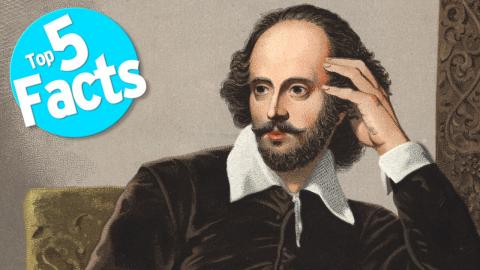Top 5 Facts about Shakespeare

He was an actor who wrote poems, and plays, and one time he even teamed up with Doctor Who to fight alien witches or something. Welcome to http://www.WatchMojo.com and Top 5 Facts. In today's installment we're counting down the top 5 most fascinating facts about William Shakespeare. Y'all ready to get cultured?
Special thanks to our user IrisFan FanIris for submitting the idea using our Interactive Suggestion Tool at http://www.WatchMojo.comsuggest
#5: Shakespeare Has Been Translated into Klingon
taH Pagh taHbe... That is the question. Shakespeare’s Hamlet has been translated into at least 75 different languages, the strangest of which is probably Klingon. Klingon Hamlet was originally published by the Klingon Language institute. It was translated By Nick Nickolas and Andrew Strader as part of the "Klingon Shakespeare Restoration Project". The book claims that Shakespeare was originally a Klingon, and his works have been shown on earth in English as an elaborate piece of Human propaganda.
#4: Shakespeare is Responsible for the North American Starling
Eugene Schiefelin, a Shakespeare enthusiast from the late 19th century tried to bring a bunch of birds to America that were referenced in Shakespeare’s poems and plays. Schiefelin’s Goal was to introduce every Shakespearian bird to America. Most of his releases were unsuccessful and sadly resulted in lots of dead birds. The major exception to this was the Starling, which really took to the new world. A little too well, even. There are currently around 200 million Starlings in America and it has become North America's most common songbird. Their huge numbers and voracious appetites have made them an invasive species; the New York Times once called them “the costliest and most noxious birds on our continent.”
#3: Macbeth Isn't Cursed, It's Just Popular
There is a history of accidents and death associated with the production of Macbeth that has led many to believe that it’s cursed. This likely isn’t true. A possible origin comes from the fact that it was a surefire crowd-pleaser, and so if a given play was failing, it could be cancelled and replaced by Macbeth. So actors may have started to dread Macbeth because if it was being practiced nearby, they knew their show was about to be canceled. Accidents have happened during the play, but it’s likely because, one, there are a lot of fight scenes in the play and, two, it has been staged literally millions of times in the last 400 years, so accidents were bound to happen.
#2: Contrary to Popular Belief Shakespeare Probably Didn't Coin Many Words
There’s no doubt that Shakespeare's poetry was innovative. But some anglophiles are way too enthusiastic when crediting him with inventing new words; sometimes he is credited with the creation of as many as 3,300 new words. Digital technology has since dropped that number to under 1,600 and it falls every year as more books become digitized, and earlier usages are discovered. A lot of these coinages become less impressive when you realize that most of them are either existing words used in a new way, or words borrowed from other languages. The number also shrinks dramatically when you look at the words that didn’t catch on like Fustilarian, Questrist, and flap-dragon. I’m kind of disappointed flap-dragon didn’t catch on. Finally, the number might be even lower because Shakespeare wrote at a time when publishing was rare and many books that he borrowed from didn’t survive the centuries.
#1: Shakespeare Works Better Than Self-Help Books
Scientists at Liverpool University have been examining brain scans of people reading poetry to see what it does to the brain. They took a bunch of passages from Shakespeare and made people read them, then modernized the spelling and made them read it again. The simplified texts didn't do much for the brain, but they found that reading the original versions with all the olden words and strange metaphors made the parts of the brain that are associated with “reappraisal mechanisms” light up. This suggests that poetry makes you rethink your own life through the lens of what you’ve just read, and it does so far more effectively than reading self-help books. Basically Shakespeare is the Elizabethan Dr. Phil– but that does not make Dr. Phil the modern Shakespeare. So what do you think? Wouldst thou bite thy thumb at a saucy flap-dragon? For more star-crossed Top 10s and wherefore art thou top 5’s be sure to subscribe at watchmojo.com.

